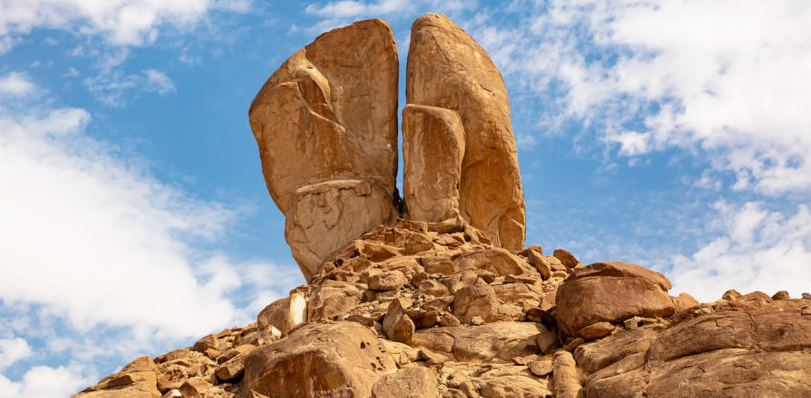“And, behold, the veil of the temple was rent in twain from the top to the bottom; and the earth did quake, and the rocks rent; And the graves were opened; and many bodies of the saints which slept arose,” (Matt. 27:51-52).
In the 24th chapter of Joshua we read of this courageous leader of Israel assembling the tribes together at Shechem in order to recount all the instances of God’s faithfulness to them and to present the people of God with a choice. “Choose for yourselves this day whom you will serve. But as for me and my household, we will serve the Lord,” (Josh. 24:15). After affirming the covenant between Israel and their God and recording it in the Book of the Law of God, Joshua does something very interesting. He takes a large stone and sets it up under a nearby oak tree. “This stone will be a witness against us. It has heard all the words the Lord has said to us. It will be a witness against you if you are untrue to your God.”
Imagine that. Joshua set this stone as a personal witness to their covenant, and in doing so attributed human properties to it, “It has heard all the words the Lord has said to us.”
Another reference to common stones taking on human properties occurs in Matthew 3:9. John the Baptist, while preaching his message of repentance, addresses the Jewish religious hypocrites (Pharisees and Sadducees) among the crowd. “Don’t think you can escape the wrath of God by saying ‘We have Abraham as our father.’ I tell you that from these stones God can raise up children for Abraham!”
And still another reference came from the Lord himself. Early in the week preceding his passion and death, the Lord instructed two of his disciples where they could find a colt on which he could ride into Jerusalem. As he descended the Mount of Olives, the people spread their clothes along the path for him to ride on. And the whole multitude of his followers began to rejoice and praise God loudly for all the mighty works they had seen Christ do, saying, “Blessed be the King that comes in the name of the Lord.”
Of course, some of these same Pharisees among the crowd were not happy with what was unfolding here before their eyes, so they urged the Lord to silence his followers. But Jesus responded instead with, “I tell you that if these should hold their peace, the stones would immediately cry out!” (Luke 19:40).
It follows, then, that when Christ breathes his final words, “It is finished,” and gives up the ghost, the rocks in and around Jerusalem respond in a way that infers a near human quality. Our text reads, “the rocks rent.” Another translation says, “the rocks split.” And those rocks that sealed off the tombs of the dead moved out of the way to allow “many bodies of the saints that slept” and came back to life to come out of their graves!
If only our hearts of stone would willingly respond as these rocks did to the death of their Maker, breaking in two as they witness the passion and death of our most holy Lord.
Contemplations:
- Lord, you are that true Rock of Rephidim, from which flows the water of life (Exod. 17:6). As Paul tells us in 1 Corinthians 10:4, that rock was Christ, out of whom flows living water. Lord, give me to drink from this fountain that I never thirst again (John 4:10).
- O my Lord and Savior, you are a rock of offense (1 Peter 2:8), the Lamb slain from the beginning. You were slain (Rev. 5:9), and yet were never more alive than in death. “Will you show wonders to the dead? Shall the dead arise and praise thee? Shall your lovingkindness be declared in the grave?” (Ps. 88:10-11)? Yes, Lord, at your death rocks miraculously split, and, wonder of wonders, dead saints come back to life to praise you!
- Not only do these dead here rise, Lord, but as the text reads, they also appear to many (Matt. 27:53). Those who witnessed this most miraculous event must surely have realized the victory you immediately achieved at your death over the power of death and the grave. And so shall I be able, in light of your conquest over death, to triumphantly say, “O death where is thy sting, O grave where is thy victory?” (1 Cor. 15:55).
Further References for Matt. 27:51-52:
Mark 15:38; Luke 23:45; Matt. 27:54; Heb. 6:19


